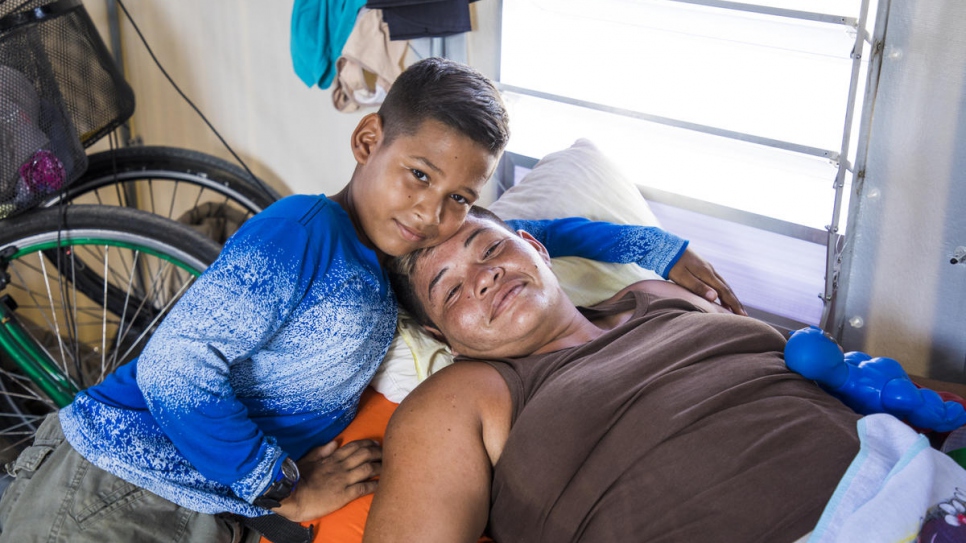'This is Moises, live from Boa Vista'
Rarely seen without his toy camera and mic – tools of the trade he hopes to enter – 10-year-old Moisés interviews his fellow Venezuelans about their journeys to Brazil.
Moises plays journalist in front of the camera in Rondon 3 shelter in Boa Vista, Brazil.
© UNHCR/Vincent Tremeau
As far as TV equipment is concerned, Moisés’ homemade video camera, which he patched together out of cardboard and tape, leaves quite a bit to be desired. Although the 10-year-old is loath to acknowledge it, the fact is that the camera very clearly does not record anything at all. But for Moisés, that is utterly beside the point.
For him, the point is to get the story – no matter whether or not it ends up being preserved for posterity. As he plies the pathways between the rows of tents in the temporary shelter in the northern Brazilian state of Roraima where he and his family have spent the past year, Moisés is always on the lookout for a good story.
“I ask people about what their journeys from Venezuela to Brazil were like,” explains the cub reporter. “The responsibilities of a journalist are to tell the news, to speak with people, and to report well.”
“His first words were at five years old. He called out the name of his sister, Valentina.”
Poised and articulate beyond his years, Moisés appears well on his way to a successful career in journalism. Holding his plastic microphone aloft, he scans the spaces between the tent rows for potential interview subjects, making a beeline to those who catch his fancy. More often than not, they accept his interview requests and end up sharing their whole, often heartbreaking stories to Moisés.
An estimated 4.6 million refugees and migrants from Venezuela are outside their country. The vast majority have made their way to other South American nations, including Portuguese-speaking Brazil, which has received an estimated 224,000 Venezuelans. They fled food and medicine shortages, galloping hyper-inflation, widespread insecurity, persecution, and the breakdown of public services. Most arrive overland, crossing the border into the remote Amazonian state of Roraima.
Moisés and his family made the trip over a year ago, making their way by bus due southward from their hometown, the northern city of El Tigre, to Pacaraima, a remote border town on the Brazilian side of the nearly 2,200-kilometer-long land border between the two countries which has become the main point of entry for Venezuelan refugees and migrants seeking safety in Brazil.
The family managed to make their way from Pacaraima to the state capital, Boa Vista, where they secured a place in the Rondon 3 temporary shelter, which receives support from UNHCR, the UN Refugee Agency and partners. Moisés, his mother, grandmother, 13-year-old sister, and godmother share a small shelter, sleeping cheek-by-jowl on foam mattresses.
Since he arrived, Moisés and his omnipresent microphone have become fixtures in the shelter. By now, he knows the stories of many of his neighbours. But because, like any good journalist, Moisés asks more questions than he answers, he tends to keep his own story mostly to himself.
His grandmother, Nelly, offers some insights into the child’s past.
“Moisés is a very sensitive boy,” she explains, adding that he suffers from a form of autism that may have resulted from the malaria his mother contracted while pregnant with him, which left her hospitalized for the first four months of Moisés’ life. “His first words were at five years old. He called out the name of his sister, Valentina.”
“He has a great imagination and a vivid internal life.”
Following his mother’s illness, Moisés went to live with his father, staying there until he was removed from the home at age three as a result of malnourishment and mistreatment. His father now lives in Italy, and with his mother now battling cancer, Grandma Nelly is now the legal guardian for Moisés and his sister.
She works hard to ensure the children’s lives are as peaceful – and joyful – as they can be, considering the circumstances.
“If he has a hard day at school, Moisés will come home and tell me that he needs time for the smoke to clear from his head,” Nelly smiles. “He has a great imagination and a vivid internal life.”
With so much going on inside him, Moisés processes his experiences – and a world of thoughts – through interactions that are mediated through a toy microphone and the lens of an imaginary camera.
“I wanted to become a journalist because of what’s happening in Venezuela,” Moisés says. “There’s a lot of hunger. There’s no light.”
But there is light, love, and wisdom inside of Moisés. For his family. For his friends. For the other Venezuelan refugees all around him.
Gripping on tightly to his plastic microphone, Moisés announces he has a message for other children around the world.
“Children should be good to each other. Friends are really important and family is really important,” he says. “Don’t treat me badly, and I won’t treat you badly and we can treat each other well.”





